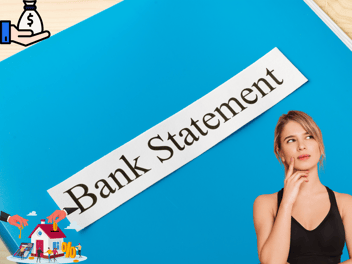6 min read

The challenges of getting a mortgage when you're self-employed
Getting a mortgage can be challenging for anyone, but it can be particularly difficult for those who are self-employed. One of the main challenges is providing proof of income. Unlike traditional employees who receive regular pay stubs, self-employed individuals often have fluctuating income and may not have the necessary documents to satisfy lenders. Additionally, self-employed individuals may have to go through more rigorous income verification processes, such as providing several years of tax returns and financial statements. However, with the right preparation and documentation, it is possible to secure a mortgage when you're self-employed.

Understanding the requirements for self-employed individuals
Understanding the requirements for self-employed individuals is essential when trying to secure a mortgage. Unlike traditional employees, self-employed individuals often face additional challenges when it comes to proving their income and financial stability. Lenders typically require a longer history of self-employment, usually two years or more, to assess the stability of the business. Additionally, self-employed individuals may need to provide more documentation, such as tax returns, profit and loss statements, and bank statements, to demonstrate their income and ability to repay the mortgage. Understanding these requirements and being prepared with the necessary documentation can greatly increase the chances of getting approved for a mortgage as a self-employed individual.
Gathering the necessary documentation for a mortgage application
Gathering the necessary documentation for a mortgage application can be a daunting task, especially for self-employed individuals. However, it is a crucial step in the process of obtaining a mortgage. Lenders typically require more documentation from self-employed borrowers to assess their income stability and ability to make mortgage payments. In addition to the standard documents such as tax returns and bank statements, self-employed individuals may also need to provide profit and loss statements, business licenses, and contracts or invoices to verify their income. Being prepared and organized with these documents can greatly streamline the mortgage application process and increase the chances of approval.
Calculating your income as a self-employed individual
Calculating your income as a self-employed individual is a key aspect of getting a mortgage. Unlike traditional employees who receive regular pay stubs, self-employed individuals often have fluctuating incomes, making it challenging to prove their financial stability to lenders. However, there are strategies you can employ to accurately calculate your income and increase your chances of mortgage approval. By analyzing your tax returns, documenting your business expenses, and providing a clear picture of your financial history, you can demonstrate to lenders that you have a reliable and sustainable income stream. Understanding the intricacies of income calculation as a self-employed individual is essential for navigating the mortgage application process with confidence.
Building a strong credit history and maintaining a good credit score
Building a strong credit history and maintaining a good credit score are key factors in getting a mortgage when you're self-employed. Lenders rely heavily on credit scores to assess the risk of lending to self-employed individuals, as they often have fluctuating income. By establishing a solid credit history and consistently paying off debts on time, you demonstrate to lenders that you are financially responsible and capable of making mortgage payments. It's also important to keep your credit utilization low and avoid opening multiple new credit accounts, as this can negatively impact your credit score. Taking these steps will greatly improve your chances of securing a mortgage and achieving your homeownership goals.
Saving for a down payment as a self-employed individual
Saving for a down payment can be a challenge for anyone, but it can be particularly daunting for self-employed individuals. When you're self-employed, your income may fluctuate from month to month, making it difficult to set aside a specific amount for a down payment. However, there are strategies that can help you reach your goal. One option is to establish a separate savings account specifically for your down payment. This will allow you to track your progress and ensure that you're not dipping into those funds for other expenses. Additionally, consider maximizing your tax deductions and minimizing your taxable income to free up more money for savings. It may also be worth exploring alternative loan options that cater specifically to self-employed individuals, as they may have more flexible requirements when it comes to down payments. With careful planning and discipline, you can overcome the hurdles of saving for a down payment and achieve your dream of homeownership.
Working with a mortgage broker or lender specializing in self-employed individuals
Working with a mortgage broker or lender who specializes in self-employed individuals is crucial when trying to secure a mortgage. Unlike traditional employees, self-employed individuals often face unique challenges when it comes to proving their income and financial stability. A specialized broker or lender understands the intricacies of self-employment and can guide you through the process, helping you gather the necessary documentation and present your financial situation in the best possible light. They can also provide valuable advice on how to improve your chances of getting approved for a mortgage, such as maintaining a strong credit score and keeping detailed records of your income and expenses. By partnering with a knowledgeable professional, you can navigate the complexities of the mortgage application process with confidence and increase your chances of successfully securing a loan.
Exploring alternative mortgage options for self-employed individuals
When you're self-employed, getting a mortgage can be a bit trickier than for those with traditional employment. However, there are alternative mortgage options available that can help you achieve your dream of homeownership. One such option is a stated income mortgage, which allows self-employed individuals to qualify for a mortgage based on their stated income rather than traditional documentation. Another option is a bank statement loan, which uses your bank statements to verify your income and expenses. These alternative mortgage options provide flexibility for self-employed individuals, allowing them to navigate the mortgage process with confidence and ease.
Tips for increasing your chances of getting approved for a mortgage
As a self-employed individual, getting approved for a mortgage can be a bit more challenging than for those with a traditional steady income. However, there are several strategies you can employ to increase your chances of getting approved. Firstly, make sure you have a solid record of your income and expenses. This means keeping detailed financial records and being able to provide them to the lender. Additionally, try to minimize your debt and improve your credit score as much as possible. Lenders will be looking for a strong credit history and a low debt-to-income ratio. Finally, consider working with a mortgage broker who specializes in working with self-employed individuals. They can help navigate the application process and find lenders who are more likely to approve your loan. By following these tips, you can improve your chances of securing a mortgage and make your dream of homeownership a reality.
Summary and final thoughts
Summary and final thoughts: Getting a mortgage when you're self-employed can be challenging, but it's not impossible. Lenders tend to scrutinize self-employed individuals more closely due to the inherent variability in income. However, by following a few key steps, you can increase your chances of securing a mortgage. Firstly, it's crucial to have your financial records in order and be prepared to provide extensive documentation. Secondly, maintaining a steady income and a good credit score can greatly enhance your credibility as a borrower. Lastly, working with a mortgage broker who specializes in self-employed individuals can be a game-changer, as they have the expertise and connections to find the best mortgage options for your unique situation. With proper preparation and the right support, you can overcome the hurdles and achieve your dream of homeownership.
Table of Content

Take your pick of loans
Experience a clear, stress-free loan process with personalized service and expert guidance.
Get a quote


